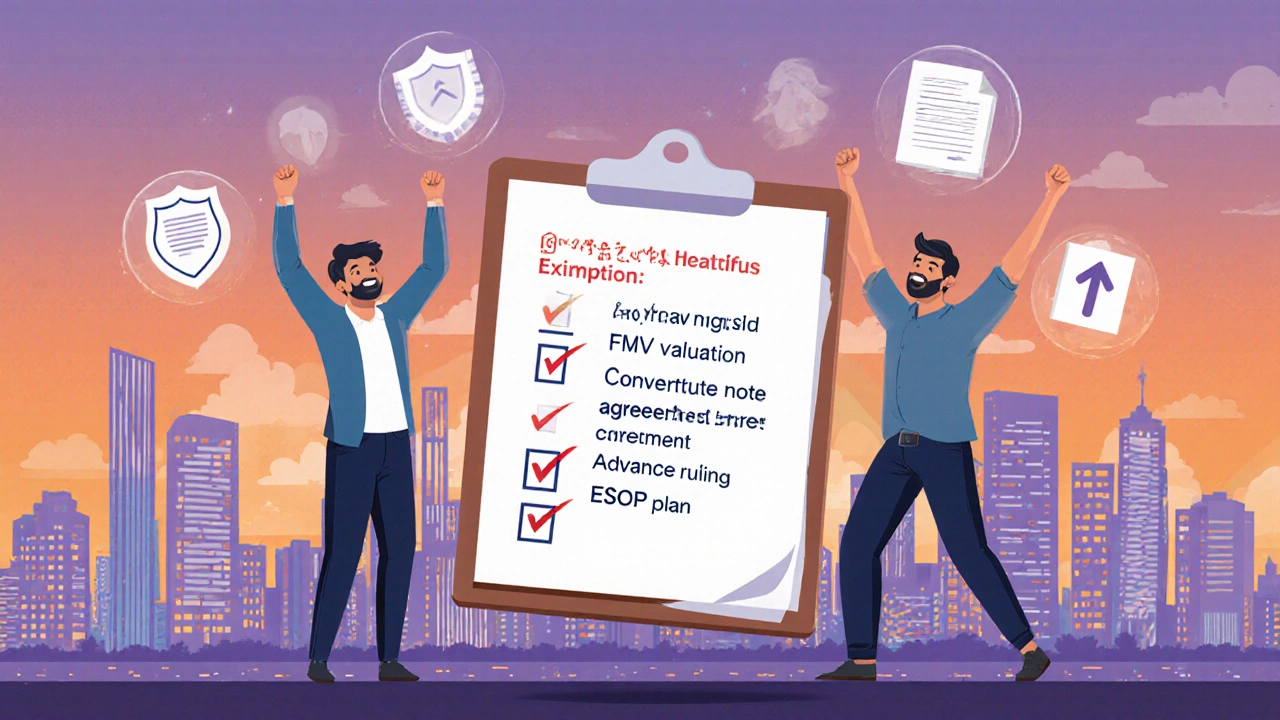Angel Tax Avoidance Calculator
Startup Details
Calculation Results
If you’re worried about angel tax and want to keep more money in your start‑up, you’re in the right place. This guide breaks down what the tax is, why it hits founders hard, and exactly what you can do today to stay clear of it.
Quick Takeaways
- Angel tax is levied under Section 56(2)(viib) when shares are issued above fair market value.
- Using a reputable valuation, issuing convertible instruments, or relying on the Startup India exemption are the safest ways to avoid it.
- Advance Ruling from the Income Tax Department can lock in a tax‑free position before you raise funds.
- Keep proper documentation: valuation report, board minutes, shareholder agreement, and filing of Form 3CA/3CB.
- Watch out for red flags like arbitrary share pricing or missing approvals - they trigger the tax automatically.
What Exactly Is Angel Tax?
Angel Tax is a tax imposed under Section 56(2)(viib) of the Income Tax Act, 1961. It kicks in when a start‑up receives capital in exchange for shares that are priced higher than the fair market value (FMV). The excess amount is treated as "income from other sources" and taxed at the individual’s slab rate.
In practice, the tax can eat up 20‑30% of the capital you thought you were getting. For a seed round of ₹2 crore, that could mean losing ₹40‑60 lakh - a huge hit for early‑stage ventures.
Why Angel Tax Matters for Start‑ups
Most founders think of equity as pure ownership, but the tax authority looks at the money you receive. If the valuation is deemed inflated, the excess is taxable. This creates two major problems:
- Cash‑flow squeeze - You have to set aside cash for tax payment, which defeats the purpose of raising funds.
- Investor hesitation - Investors shy away from markets where their investment could be taxed twice.
Since 2017, the government has introduced several relief measures, but they only work if you follow the right procedures.

Legal Ways to Avoid or Mitigate Angel Tax
Below are the most reliable methods, each backed by rulings from the Income Tax Department or the Ministry of Corporate Affairs.
1. Rely on the Startup India 100% Tax Exemption
Start‑ups recognized under the Startup India scheme enjoy a full exemption from angel tax for up to three years, provided they meet the criteria:
- Incorporated after 1 January 2016.
- Annual turnover less than ₹100 crore.
- Not a subsidiary of a larger firm.
- Have a valid certificate from the Department for Promotion of Industry and Internal Trade (DPIIT).
To claim the exemption, file Form 3CD along with the valuation report and attach the DPIIT certificate. The tax department checks the certificate before applying any tax.
2. Obtain a Robust Fair Market Value Valuation
Using a qualified chartered accountant or a registered valuer to produce a FMV report is the single most effective way to prove that share pricing is reasonable. The report should include:
- Methodology (DCF, market multiple, or asset‑based).
- Comparable transactions in the sector.
- Assumptions and sensitivity analysis.
- Signature and seal of the valuer.
When the valuation is accepted, the excess amount disappears, and no angel tax is levied.
3. Use Convertible Instruments (SAFE, Convertible Notes)
Instead of issuing equity at a fixed price, many founders opt for Simple Agreement for Future Equity (SAFE) or convertible notes. These instruments defer valuation until a later financing round, keeping the current transaction out of the angel tax net.
Key points to remember:
- Set a reasonable conversion discount (usually 10‑20%).
- Include a valuation cap to protect early investors.
- Document the instrument with a proper agreement and board resolution.
Because no shares are issued immediately, there’s no price to compare against FMV, so angel tax does not arise.
4. Seek an Advance Ruling from the Income Tax Department
An Advance Ruling (AR) is a written opinion from the authority on how a proposed transaction will be treated. If you obtain a favorable AR confirming that the share price reflects FMV, you can raise funds confidently.
Procedure:
- Submit Form 35 to the jurisdictional authority.
- Attach the valuation report, shareholder agreement, and board minutes.
- Pay the prescribed fee (around ₹10,000).
- Wait for the decision - usually 90 days.
Once granted, the AR is binding for the fiscal year, shielding you from later disputes.
5. Structure Funding as a Qualified Institutional Placement (QIP)
For start‑ups that are already listed or planning an IPO, raising capital via QIP can bypass angel tax because the securities are issued to institutional investors at market price, which is inherently considered FMV.
Requirements include:
- Compliance with SEBI regulations.
- Minimum issue size of 10% of paid‑up capital.
- Pricing based on a recent price discovery method.
If you meet these, the transaction is outside the scope of Section 56(2)(viib).
6. Issue Employee Stock Options (ESOPs) at FMV
ESOPs granted at a price equal to the FMV determined by a proper valuation are also safe. The key is to file the ESOP scheme with the Registrar of Companies (ROC) and maintain a valuation audit annually.
Step‑by‑Step Checklist to Stay Angel‑Tax Free
- Confirm your start‑up qualifies for the Startup India exemption. Obtain the DPIIT certificate.
- Engage a certified valuer to prepare a FMV report before any equity issue.
- Decide on the funding instrument - direct equity, convertible note, SAFE, or QIP.
- Draft a shareholder agreement that records the price per share and includes board approval minutes.
- If using convertible instruments, ensure the conversion terms are clearly documented.
- File Form 3CD (or Form 3CB/3CD for companies) with the valuation report attached.
- Consider applying for an Advance Ruling for added certainty.
- Maintain all documents (valuation, agreements, board resolutions) for at least six years as per tax law.
Following this checklist will give you a solid defense if the tax department ever questions your transaction.
Common Pitfalls that Trigger Angel Tax
- Arbitrary share pricing - Setting a high price without a valuation is a red flag.
- Missing Board Resolution - The authority looks for corporate approval of the issue.
- Incorrect filing of Form 3CD - A slip can lead to a default assessment.
- Ignoring the three‑year exemption window - After three years, the exemption lapses.
- Using related‑party transactions without arm‑length pricing - This is treated as a deemed transfer.
Even if you think the tax doesn’t apply, the department can retroactively assess it, leading to penalties and interest.

Frequently Asked Questions
What is the exact definition of angel tax under Indian law?
Angel tax is the tax levied on the amount received by a start‑up in excess of the fair market value of shares, as per Section 56(2)(viib) of the Income Tax Act, 1961.
Does the Startup India exemption apply to all kinds of funding?
The exemption covers equity funding, convertible instruments, and any share‑based capital raise, provided the start‑up holds a valid DPIIT certification and files the required returns.
How often should a start‑up get a new valuation?
A fresh valuation is recommended before each equity‑based funding round. For listed securities (e.g., QIP), the price discovery itself serves as the valuation.
Can I rely solely on a convertible note to avoid angel tax?
Yes, if the note does not convert into equity at the time of issuance. The conversion event later will be treated as a separate equity issue, at which point a fresh valuation is required.
What documents should I keep for an Advance Ruling?
Submit Form 35 along with the valuation report, shareholder agreement, board minutes, and a copy of the DPIIT certificate. Keep the AR letter and all supporting papers for at least six years.
If I missed the three‑year exemption window, can I still avoid the tax?
You can still avoid angel tax by securing a robust FMV valuation, using convertible instruments, or obtaining an Advance Ruling. The exemption merely provides automatic relief for eligible start‑ups.
Next Steps and Resources
Now that you know the playbook, here’s what to do:
- Contact a chartered accountant experienced with start‑up valuations.
- Apply for the DPIIT certification if you haven’t already.
- Draft your funding instrument with legal counsel - keep the language clear and include FMV clauses.
- File the necessary forms (3CD/3CB, Form 35) well before the capital is received.
- Set up a document repository (cloud storage with version control) to retain all approvals, valuations, and rulings.
By treating angel tax avoidance as a compliance project rather than an after‑thought, you’ll protect your runway and keep investors happy.
Comparison of Common Angel‑Tax Avoidance Methods
| Method | Key Requirement | Tax Effectiveness | Complexity |
|---|---|---|---|
| Startup India 100% exemption | DPIIT certificate + Form 3CD filing | Full exemption (0% tax) | Low |
| Robust FMV valuation | Chartered accountant/registered valuer report | Tax avoided if valuation accepted | Medium |
| Convertible instruments (SAFE/notes) | Convertible agreement with discount/cap | No tax at issuance; tax may arise on conversion | Medium |
| Advance Ruling | Form 35 + supporting documents | Binding tax‑free position for the year | High (time & fee) |
| Qualified Institutional Placement (QIP) | SEBI compliance & market‑price issue | Outside Section 56(2)(viib) | High (listed company only) |
| ESOPs at FMV | Annual valuation + ROC filing | Tax‑free if FMV respected | Medium |
Pick the method (or mix) that fits your company’s stage, capital needs, and regulatory comfort level.

